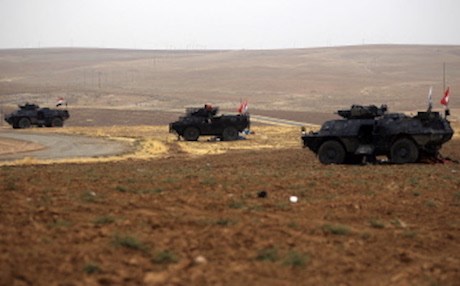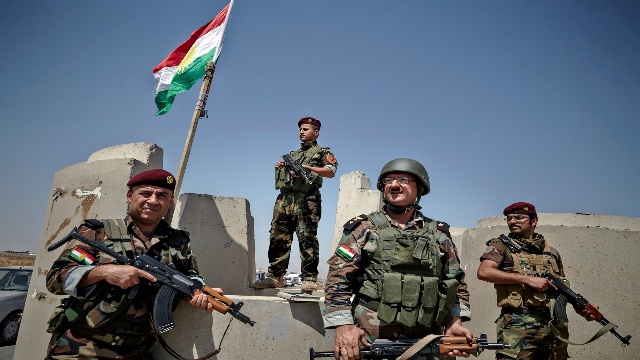www.aljazeerah.info
News, November 2017
Archives
Mission & Name
Conflict Terminology
Editorials
Gaza Holocaust
Gulf War
Isdood
Islam
News
News Photos
Opinion Editorials
US Foreign Policy (Dr. El-Najjar's Articles)
www.aljazeerah.info
|
Editorial Note: The following news reports are summaries from original sources. They may also include corrections of Arabic names and political terminology. Comments are in parentheses. |
Iraqi Kurdish and Federal Government Forces Negotiate Border Positions, Under US Mediation
November 4, 2017
 |
 |
| Iraqi federal government forces gather at their camp on the front line in the northwestern town of Fish Khabur , near the borders with Syria and Turkey, on October 28, 2017 | Iraqi Kurdish soldiers (Peshmerga), file, November 4, 2017 |
Erbil awaits Baghdad’s response on seven-point proposal
By Rudaw, November 4, 2017
ERBIL, Kurdistan Region -
A member of the Kurdish military delegation in charge of negotiation
with Iraq said that they had submitted to their Iraqi counterparts a
seven-point paper concerning border and territorial disputes and that
they are now waiting to hear back from Baghdad.
“In the latest
meeting between the Kurdistan Region and the Iraqi government held on
Thursday in Mosul, each side had prepared a seven-point paper for talks.
After each side reading the others’ papers, and we receiving Kurdistan
political leadership’s consent, we handed a [final] seven-point paper to
Iraq and are now awaiting their response,” said Jabar Yawar, Chief of
Staff of the Peshmerga Ministry.
Revealing the content of the
paper, Yawar said, “Overall, the paper contain the deployment of joint
forces to the disputed areas, the numbers of the force and who would
command them.”
Yawar said in their paper, they suggested the
deployment of “civilian and coalition forces to the border crossings."
Erbil and Baghdad have faced off each other near Fish Khabur where
the borders of Iraq, Syria and Turkey meet at a triangle. The Peshmerga
and Iraqi army and Hashd al-Shaabi also came to brief clashes last week.
Without providing further details about the seven points, Yawar said
there were serious disagreements over three of them.
Iraqi and
Kurdish military officials have met a few times under coalition
supervision in the past two weeks to settle differences peacefully than
through force.
Babakir Zebari, a veteran Peshmerga and former
Chief of Staff of the Iraqi army, told Rudaw that Thursday’s talks were
a continuation of the previous discussions.
The Iraqi military
issued a statement on Wednesday saying that the talks had failed after
Kurdish officials withdrew from a draft agreement, bringing the two
sides back to “square one.” It called the Peshmerga “armed groups linked
to Erbil” and said they will become a target if they confronted federal
forces in the disputed areas and on the international borders.
The Peshmerga issued a counter statement, denying that there was an
agreement in the first place and described the Iraqi demands as
“unconstitutional” and posing a threat to the Kurdistan Region.
The Peshmerga said they are stationed in their defense lines and ready
to protect the Kurdistan Region and its people.
http://www.rudaw.net/english/kurdistan/041120173
PM Barzani and Tillerson stress 'political dialogue' with Baghdad in phone call
By Rudaw
ERBIL, Kurdistan Region –
Kurdistan Region Prime Minister Nechirvan Barzani and US Secretary of State Rex Tillerson both emphasized the need for political negotiations to begin between Erbil and Baghdad in a phone call on Friday, according to a statement from Barzani’s office.
“US Secretary of State Rex Tillerson expressed his concerns over the tensions between Erbil and Baghdad and reemphasized the support of the United States for the constitutional rights of the Kurdistan Region in Iraq,” read the Kurdish statement released on Friday night.
He also hoped that the existing ceasefire and security dialogue between Iraqi and Kurdish military officials “will be turned into a political dialogue to solve the problems between the Kurdistan Region and Iraq.” There was no immediate statement from Tillerson’s office.
PM Barzani, despite expressing concerns over Baghdad’s continued military advances, stressed “the full readiness of the Kurdistan Region to begin political dialogue for the sake of a peaceful solution for the problems.” The prime minister said he hoped the international community, and the United States in particular, will urge Iraq to enter talks and avoid resorting to military options.
He added that the Kurdistan Region does not want war as conflict will not solve anything. He said Erbil instead wants “to solve everything with the federal government of Iraq within the framework of the Iraqi constitution.” PM Barzani and his deputy Qubad Talabani hosted US Ambassador to Iraq Douglas Silliman in Erbil on Thursday.
During their meeting, Ambassador Silliman expressed his “concerns” over deadly clashes in the disputed areas. He hoped that the two sides would make serious efforts to avoid tensions and begin talks. To achieve this, Silliman said the “continuation of ceasefire is necessary,” according to a statement from the Kurdistan Regional Government (KRG).
The US is overseeing military talks between Iraqi and Kurdish forces regarding the deployment of federal troops to disputed areas and Kurdistan Region’s international borders. No agreement has yet been reached, but talks continued on Thursday in Mosul. Prime Minister Barzani has assumed new powers after the duties of the president were distributed among the prime ministry, the parliament, and the judiciary following a vote by the parliament on the resignation of former Kurdistan Region President Masoud Barzani – a move welcomed by the US.
The US State Department on Monday expressed its support for the “new leadership” headed by PM Barzani. Relations between Erbil and Baghdad have reached their lowest point after an Iraqi-led military operation drove Peshmerga forces out of oil-rich Kirkuk and many other disputed areas since October 16, resulting in the worst crisis between the two since the US-led invasion of Iraq in 2003.
The Kurdistan Region has offered to freeze the outcome of its vote on independence in return for open dialogue with Baghdad in light of the Iraqi constitution, a move welcomed by Washington, but rejected by Baghdad who wants the vote cancelled.
http://www.rudaw.net/english/kurdistan/031120173
Baghdad, Erbil delegations to meet on troops deployment at disputed regions: Official
by Nehal Mostafa Nov 4, 2017, 2:53 pm
Erbil (IraqiNews.com) --
A new meeting will be held between two military delegations from Baghdad and Erbil, a kurdish official declared.
“The two military delegations, who had met in Mosul, made proposals on deploying federal troops at the disputed regions and border crossings,” Jabar al-Yawar, secretary general of the Ministry of Peshmerga.
“The last meeting lasted for more than three hours and came up to understanding by the two sides on some issues. However, there was disputes on other issues,” he added.
“After the meeting, the two delegations went back to discuss the proposals, before setting a new appointment for meeting,” Yawar said.
Hadi al-Ameri, secretary-general of Badr Organization, ruled out on Friday possibilities that Iraqi federal troops attack the kurdish Peshmerga at the disputed regions in Nineveh and Kirkuk.
A meeting was held on Thursday between two delegations without reaching an outcome, a source told Alghad Press. The kurdish delegation was angry during the meeting, according to the source, without giving further details.
Iraqi troops have been on high alerts in west of Mosul, after Erbil was declared to have stepped back from an agreement between with Baghdad.
This came after Kurdistan Regional Government had proposed joint Iraqi-Kurdish deployment at Khabur strategic border crossing between the region and Turkey, with participation of observers from the U.S.-led Coalition.
Since Kurdistan held its independence referendum on September 25, Baghdad had declared intentions to retake areas disputed on with Erbil.
Iraqi, Kurdish delegations convene in Mosul on running disputed regions
by Nehal Mostafa Nov 2, 2017, 9:14 pm
Mosul (IraqiNews.com) --
Two Iraqi and Kurdish military delegations have convened in Mosul for talks over Iraqi troops deployment at disputed regions between Erbil and Baghdad, BasNews reported.
The meeting, sponsored by U.S., started in the evening on Thursday and is still ongoing.
According to informed sources, the meeting is supposed to tackle several new proposals on Iraqi troops deployment in disputed regions.
Another source told Alghad Press that the meeting is expected to last for long time, “especially after the two governments of Baghdad and Erbil confirmed necessity to come up with a resolution that satisfies both solutions as soon as possible.”
Iraqi troops have reportedly been on high alerts in west of Mosul, after Erbil was declared to have stepped back from an agreement between with Baghdad.
Kurdistan Regional Government proposed, early today, joint Iraqi-Kurdish deployment at Khabur strategic border crossing between the region and Turkey, with participation of observers from the U.S.-led Coalition
This came after general administration of Khabur exit denied on Wednesday news that Iraqi troops took control on it. Moreover, Jabbar al-Yawar, secretary general of Peshmerga Ministry told Sputnik agency that no federal troops exist at the crossing.
The crossing has been under focus after Iraqi authorities imposed strict measures on it after Kurdistan held its independence referendum on September 25.
Since then, Baghdad had declared intentions to retake areas disputed on with Erbil.
Paramilitary official: Iraqi troops unlikely to attack Peshmerga at disputed regions
by Nehal Mostafa Nov 3, 2017, 11:49 pm
Nineveh (IraqiNews.com) --
A senior paramilitary official has ruled out possibilities that Iraqi federal troops attack the kurdish Peshmerga at the disputed regions in Nineveh and Kirkuk.
Speaking to reporters in Nineveh on Friday, Hadi al-Ameri, secretary-general of Badr Organization said, “Iraqi security services have no intentions to attack the Kurdish brothers.”
“We don’t seek fighting the Kurds. They are our people. Brothers in Erbil should be aware of this and order withdrawal of Peshmerga to the administrative borders of Nineveh,” he added.
“We hope that security prevails at these regions [disputes areas in Nineveh] in an easy way like what happened in Kirkuk,” Ameria said.
Badr Organization is a major component of the Popular Mobilization Forces, the Shia-led alliance of paramilitary troops fighting Islamic State militants alongside the Iraqi government.
PMF sources say Ameri, along with Abu Mahdi al-Muhanids, deputy chief of the PMF, lead a huge attack last week in disputed regions in west of Duhuq, however, Peshmerga managed to repulse the attack.
On Thursday, two Iraqi and Kurdish military delegations have convened in Mosul for talks over Iraqi troops deployment at disputed regions between Erbil and Baghdad. News circulated, earlier on the day, said Iraqi troops have been on high alerts in west of Mosul, after Erbil was declared to have stepped back from an agreement between with Baghdad.
This came after Kurdistan Regional Government had proposed joint Iraqi-Kurdish deployment at Khabur strategic border crossing between the region and Turkey, with participation of observers from the U.S.-led Coalition.
Since Kurdistan held its independence referendum on September 25, Baghdad had declared intentions to retake areas disputed on with Erbil.
Iraqi government forces approached the southern borders of Erbil, capital of semi-autonomous Kurdistan Region, after taking over Kirkuk province from Kurdish Peshmerga fighters in October, fulfilling instructions made by Prime Minister Haidar al-Abadi to retake those regions.
***
Share the link of this article with your facebook friendsFair Use Notice
This site contains copyrighted material the
use of which has not always been specifically authorized by the copyright
owner. We are making such material available in our efforts to advance
understanding of environmental, political, human rights, economic,
democracy, scientific, and social justice issues, etc. We believe this
constitutes a 'fair use' of any such copyrighted material as provided for
in section 107 of the US Copyright Law. In accordance with Title 17 U.S.C.
Section 107, the material on this site is
distributed without profit to those
who have expressed a prior interest in receiving the included information
for research and educational purposes. For more information go to: http://www.law.cornell.edu/uscode/17/107.shtml.
If you wish to use copyrighted material from this site for purposes of
your own that go beyond 'fair use', you must obtain permission from the
copyright owner.
|
|
|
|
||
|
||||||


